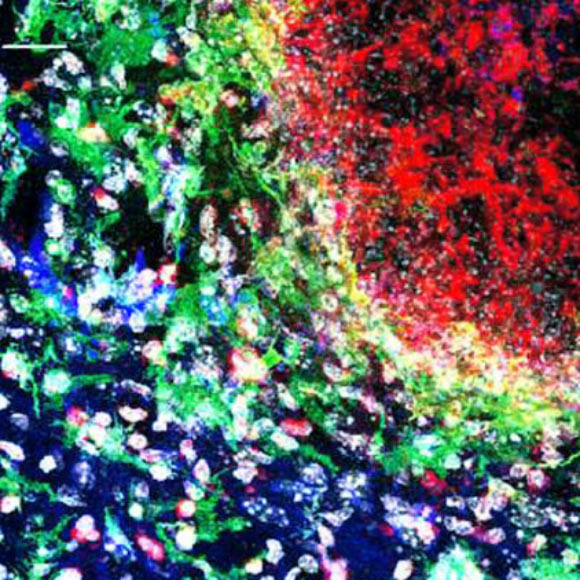A fungal pathogen called Candida albicans can cross the blood-brain barrier and trigger an inflammatory response that results in the formation of granuloma-type structures and temporary mild memory impairments in mice, according to a study published in the journal Nature Communications.

Wild-type mice were challenged with Candida albicans and immunofluorescence staining for DAPI, IBA1, Aβ, and GFAP was performed on brain sections containing fungal granulomas. Image credit: Wu et al, doi: 10.1038/s41467-018-07991-4.
Diverse environmental fungi are increasingly recognized as causal or contributory to the majority of common chronic, cutaneous inflammatory conditions such as atopic dermatitis (eczema), onychomycosis, and common mucosal inflammatory conditions.
Cutaneous candidal disease in the form of mucocutanous candidiasis assumes a much more invasive and destructive character in the context of immunodeficiencies.
Fungi are further implicated in diseases as diverse as rheumatoid arthritis and Alzheimer’s disease.
“These observations led us to investigate the possibility that fungus might produce a brain infection and, if so, the consequences of having that kind of infection,” said Baylor College of Medicine’s Professor David Corry, senior author of the study.
Professor Corry and colleagues began their investigation by developing a mouse model of a low-grade fungus infection with Candida albicans that would not cause severe disease, but might carry implications for brain function.
The researchers tested several doses and finally settled on one dose of 25,000 Candida albicans cells.
They injected yeast cells into the blood stream of mice and were surprised to discover that the yeast can cross the blood-brain barrier, a robust protective mechanism the brain employs to exclude all kinds of large and small molecules, as well as a number of microorganisms that can potentially damage the brain.
“We thought that yeast would not enter the brain, but it does,” Professor Corry said.
“In the brain, the yeast triggered the activity of microglia, a resident type of immune cell. The cells became very active ‘eating and digesting’ the yeast.”
“They also produced a number of molecules that mediated an inflammatory response leading to the capture of the yeasts inside a granule-type structure inside the brain. We called it fungus-induced glial granuloma (FIGG).”
The team also tested the animals’ memory in both yeast-infected and non-infected mice.
The study authors found that infected mice had impaired spatial memory, which reversed when the infection cleared.
The mice cleared the yeast infection in about 10 days; however, the microglia remained active and the FIGGs persisted well past this point, out to at least day 21.
Intriguingly, as the FIGGs formed, amyloid precursor proteins accumulated within the periphery and amyloid beta molecules built up around yeast cells captured at the center of FIGGs. These amyloid molecules are typically found in plaques that are the trademark of Alzheimer’s disease.
“These findings suggest that the role fungi play in human illness potentially goes well beyond allergic airway disease or sepsis,” Professor Corry said.
“The results prompted us to consider the possibility that in some cases, fungi also could be involved in the development of chronic neurodegenerative disorders, such as Alzheimer’s, Parkinson’s and multiple sclerosis. We are currently exploring this possibility.”
“For these reasons, if we better understand how our immune system deals with this kind of constant threat and what are the weaknesses in our immunological armor that occur with aging that allow fungal disease to take root, then we would likely increases the possibility of finding ways to fight back.”
_____
Yifan Wu et al. 2019. Microglia and amyloid precursor protein coordinate control of transient Candida cerebritis with memory deficits. Nature Communications 10, article number: 58; doi: 10.1038/s41467-018-07991-4







